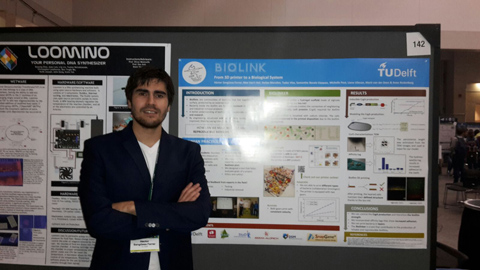Former UAB student among winners of the International Genetically Engineered Machine (iGEM) Competition

07/10/2015
Hector Sangüesa Ferrer, a former Biotechnology student at the UAB, currently at Delft University of Technology in the Netherlands, is one of the winners of the International Genetically Engineered Machine (iGEM) Competition. This competition, described by the Washington Post as the "science World Cup", is held every year in Boston and brings together teams of students from top universities around the world. This year 259 teams were competing to present the best project in the field of synthetic biology.
The team of students from Delft, Hector among them, designed a 3D printer to produce bacterial biofilm. One curious fact about this project is that the printer was built out of K’nex, a children's construction toy.
Hector and his team came out on top, with their entry winning the top prize. In fact they also won three more prizes: best hardware project, best wiki and best applied design.
The project's main goal was to create a 3D printer capable of creating customisable and reproducible bacterial biofilm for testing purposes. These biofilms, made up of different microorganisms, cling firmly onto surfaces and are extremely difficult to eliminate. They are thus more resistant to antibiotics and can cause problems, for example, in medical implants.
After coming up with the idea and turning it into a viable project, the team found they were able to create biofilms quickly and systematically, using protein nanowires produced by bacteria and the 3D printer to distribute these. The system used, described as low-cost, automatic and easy to implement, allows a standard to be created for producing bacterial biofilm.